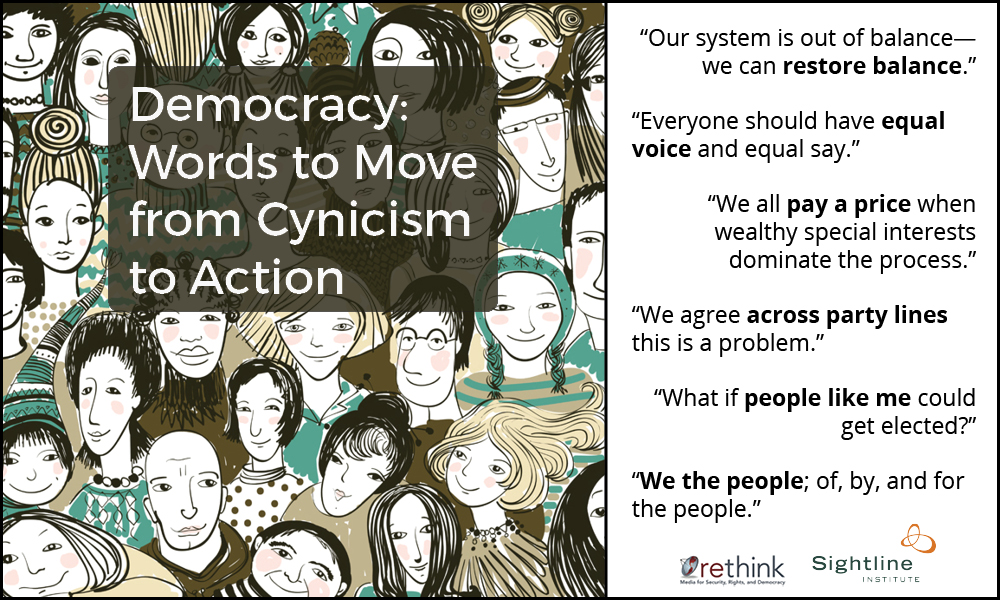91% of Americans agree that money in politics is a problem. Only 9% feel that we can do anything about it.
Americans across demographics and party lines and in every corner of the country get it: Ninety-one percent agree that money in politics is a problem.
But the very nature of the problem leads to cynicism, not confidence that we can restore balance. Only 9 percent of Americans feel that we can do anything about it.
So, as messengers about reform, our job is not to convince anybody that the system’s broken. It is to convince people that we can actually fix it.
The good news is that there is a vast swath of “persuadable” Americans who are receptive to democracy reforms—even if they are not automatically supportive.
ReThink Media has put together guidelines for messaging democracy policy solutions, based on several major research projects, including polling and focus group research by the Democracy Initiative and Demos, the Purpose Institute, the Topos Partnership, and the Women Donors Network.
They identify specific language and messages that work and also remind us to sandwich the policy particulars in aspirational messages and shift the conversation to focus on goals and solutions, not just problems.
Here is a snapshot of the most powerful language. For more words that work to move the needle on democracy reform, see the full guide:
Talk about a SYSTEM OUT OF BALANCE (not just “money in politics”).
How we frame the problem can shift how people see solutions. A system out of balance triggers positive thinking about solutions for participation, representation, and democracy. Restoring balance feels possible, while getting money out of politics can feel hopeless. The way we define the problem can get us out of the ruts that reinforce it as inevitable: Bought politicians or a corrupt system.
These words resonate broadly: EVERYONE SHOULD HAVE EQUAL VOICE AND EQUAL SAY.
No matter their party affiliation, people favorably respond to the simple principle of fairness in democracy—that every citizen should have an equal voice and an equal say and that every voice should be heard.
Tap into shared democratic ideals with powerful language: WE THE PEOPLE, OUR VOICES, OF, BY, AND FOR THE PEOPLE.
We have ready-made phrases and language that evokes democratic ideals and shared values: “We the people,” and “of, by, and for the people.” Inclusive pronouns make messages more personal: us, we, our government, your voice.
Show what it could look like when barriers are removed: WHAT IF “PEOPLE LIKE ME” COULD GET ELECTED?
Even the most cynical voters are enthusiastic about removing barriers for “people like me” to run for office and represent their communities.
Build bridges by reminding people that AMERICANS OF ALL POLITICAL STRIPES AGREE ON THE PROBLEM.
Build bridges across party lines by stressing that Americans of all political stripes agree on the problem. To forge the same level of accord on steps forward, engage conservatives on “gateway” solutions: transparency, ethics, and enforcement. And deploy credible messengers on the left and the right.
Connect the problem and solutions to people’s personal priorities: WE ALL PAY A PRICE when WEALTHY SPECIAL INTERESTS dominate the political process.
Connect democracy reform to issues of personal and local importance: “We all pay a price when big-box retailers lobby against a living wage, corporate polluters spend millions to stall progress on clean energy solutions, or the pharmaceutical industry writes healthcare policy.” Then show that we have solutions to restore balance—and that those fixes mean progress on issues people care deeply about. “Solutions like small-donor matching systems for funding elections restore balance so that candidates listen to the voters, not just big donors.”
And, don’t make politicians or government the villains. “Wealthy special interests” resonates with voters across demographics and prompts less apathy and cynicism.
[list_signup_button button_text=”Like what you|apos;re reading? Sign up for our democracy newsletter here.” form_title=”Reclaiming Our Democracy” description=”Stay up to date with Sightline’s latest democracy research.” selected_lists='{“Reclaiming Our Democracy”:”Reclaiming Our Democracy”}’ align=”center”]

